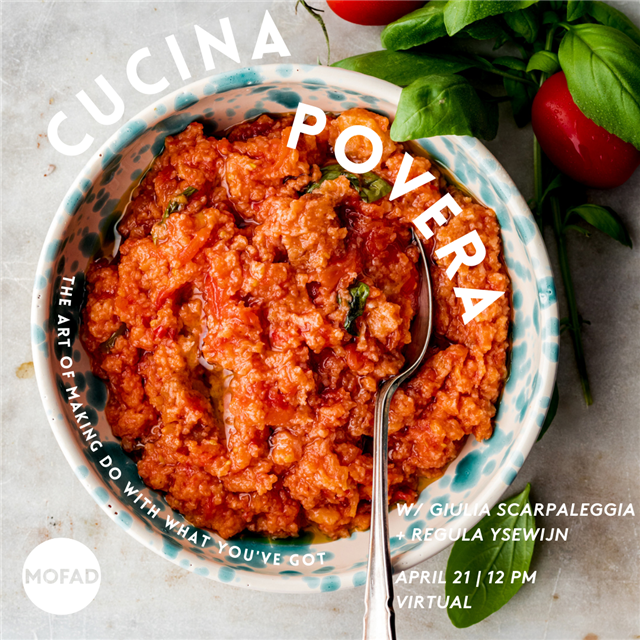|
 |
FEATURED PROGRAM
Cucina Povera: The Art of Making Do with What You've Got
Friday, April 21
12pm ET ONLINE
The Italians call it l’arte dell’arrangiarsi—the art of making do with what you’ve got. They’ve been cooking this way for centuries, a unique approach to ingredients and techniques known as cucina povera, or peasant cooking, that results in the highest expression of what Italian food is all about—transforming simple components into unforgettably delicious and satisfying meals. It’s also a way of cooking that, with some notable exceptions like minestrone, ribollita, and pasta e fagioli, is not well known outside of Italy. Author Giulia Scarpaleggia is determined to change that. Join MOFAD for a virtual lunch hour on Friday, April 21 with
Cucina Povera author Giulia Scarpaleggia and internationally acclaimed food writer Regula Ysewijn. They’ll be discussing the ingenious culinary traditions of Giulia’s culture and the resourcefulness of the strong Italian women who came before her.Giulia will be leading a demo of her recipe for Pappa al Pomodoro (tomato and bread soup), her ultimate comfort food, and a very representative dish of the principles of cucina povera.
Join MOFAD for a virtual lunch hour on Friday, April 21 with Cucina Povera author Giulia Scarpaleggia and internationally acclaimed food writer Regula Ysewijn. They’ll be discussing the ingenious culinary traditions of Giulia’s culture and the resourcefulness of the strong Italian women who came before her.
Giulia will be leading a demo of her recipe for Pappa al Pomodoro (tomato and bread soup), her ultimate comfort food, and a very representative dish of the principles of cucina povera.
|
|
|
|
|
|
Urban Ecosystems: Living Among the Plants, Animals, and Fungi of NYC
Thursday, April 20
6:30-7:30pm ET
in-person at the Museum of the City of New York
|
|
|
|
|
Alongside New York City’s diverse population of humans, bustling communities of plants, animals, and fungi have co-evolved within an ever expanding urban landscape. The island of Manhattan is a vibrant oasis for thousands of species, including many endangered wild native plants, foraged foods, and cultivated crop varieties that carry with them the stories of our rich cultural heritage as New Yorkers. Often hidden in plain sight, the vast network of biodiversity that lives between buildings and among urban green spaces is also critical to safeguarding our future food security.
Hosted by MCNY curator and food justice activist Monxo Lopez, we’ll hear stories from Yemi Amu, founder and director of Oko Urban Farms; Sigrid Jakob, president of the New York Mycological Society; Candace Thompson, manager of Solar 1’s Stuy Cove Park; William Mullan, an artist and apple forager and photographer; Iakowi:he'ne' Oakes, founder and executive director of the North American Indigenous Center of New York; and botanist and biodiversity activist, Marielle Anzelone.
|
|
|---|
|
Culinary Historians of New York 2023 Scholars' Grants
Funding by Julia Child Foundation for Gastronomy and Culinary Arts
Application Deadline: May 5, 2023
|
|
|
|
|
Culinary Historians of New York invites submissions for the 2023 CHNY Scholars’ Grant in support of research and scholarship in the field of culinary history. Since 2012, the CHNY Scholar’s Grant has been recognized by the Julia Child Foundation with generous financial support. CHNY will award three grants in the amounts of $3,500, $2,500, and $1,500. The grants are open to all individuals age 18 and older. The awards will be announced in August.
The CHNY Scholars’ Grant promotes research and scholarship in the field of culinary history and is awarded annually to individuals seeking financial support for a current, well-developed project that will culminate in a book, article, paper, film, or other scholarly endeavor, including ephemera. The grants are unrestricted and can be used to defray research expenses, attend conferences, or engage in other activities directly related to the applicant’s project. Applicant should include a statement of how the funds will be used to advance the project.
Further details and application requirements and forms can be found on the CHNY website.
|
|
|---|
|
| |
|
In honor of Herbalist Day and all the ways herbalism has contributed to our shared foodways, we're listening to " Little Medicine Thing," an oral history conducted by East Carolina University with Emma Dupree, an influential African-American folk herbalist from Pitt County, North Carolina.
|
|
|---|
|
|
|
 | |
|  |
|
|
|
|

